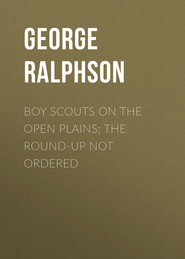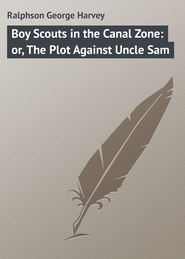По всем вопросам обращайтесь на: info@litportal.ru
(©) 2003-2024.
✖
Over There with the Canadians at Vimy Ridge
Настройки чтения
Размер шрифта
Высота строк
Поля
Next day Irving's left shoulder was so sore that he was unable to use the arm. He tried to conceal his embarrassment, but it was observed by Sergt. MacDonald, who reported it to Lieut. Osborne. Then followed an examination, which proved that the young American's shoulder was discolored and swollen as a result of the wound he received following the explosion of minnenwerfer No. 1 near the listening pit early in the evening, and he was ordered behind the lines for treatment.
CHAPTER VI
A LITTLE HISTORY
Irving was not confined to an invalid's couch at the hospital behind the Canadian lines. His left arm was put in a sling and his shoulder bandaged in hot cloths, frequently changed. It was found that the stone that struck him had strained and bruised the muscles and ligaments severely, so that the subsequent use of the arm had brought about a condition resembling results of a bad sprain.
He was in the hospital a little over a week, and although he was not subjected to any of the heroic treatment that is administered to many of the wounded, yet the exciting thrills that had filled his short experience in trench and No Man's Land with "lots of pep and pepper" had a very fitting sequel in his hospital sojourn, very much unlike the usual wearisome wait of the wounded.
As we have intimated, Private Irving Ellis was an American of the United States brand. His home was in Buffalo, N.Y. His father was a ship captain employed by a company that operated a line of passenger and freight steamers on the Great Lakes. As a result the boy grew up a "fresh water tar." He worked with his father on the latter's boat most of the time during the summer vacations after he reached his teens.
The steamer of which Mr. Ellis had charge touched at several Canadian as well as United States ports. In one of these lived an uncle of Irving's, John Douglas, and the latter's family.
Mr. Ellis had married a Scotch Canadian bride, and as both families lived near Lake Erie, there was frequent visiting between them back and forth across the mid-water line.
As a result, Irving's best chum of his schoolboy days was his cousin, Bob Douglas. They were about the same age, and both were fond of life on the lake. Bob also was given work under Mr. Ellis's command in the summer when he became old enough to be of service on board.
Soon after England declared war against Germany, Canada began the organization of an army to aid her mother country in the great fight, and Bob was one of the first to enlist. On the day of his enlistment he wrote a long letter full of fiery patriotism to his cousin over in the United States, and perhaps you can imagine the sensation this communication created in the family of the steamboat captain.
But no, you can't, for the big sensation was not immediate. Of course, there was a good deal of excitement among Irving's brothers and sisters-two boys and two girls, all younger than he. Cousin Bob was a real hero in their minds, and Irving envied him. The violation of the Belgian treaty, the storming of Liege and the invasion of France across the Belgian frontier were still fresh in the minds of the people everywhere. The "scrap of paper" was still waving like a red flag in the face of popular demand for the inviolability of international honor.
Well, two days later, Irving electrified the family circle at the breakfast table with the announcement that he wished to enlist. Nobody protested; nobody approved. In fact, Mr. Ellis had paved the way for his oldest son's wish by expressing the opinion that the United States would be drawn into the war before it was over. Even the younger children were so imbued with a sense of the seriousness of the great struggle as a result of things they had heard father, mother, and older brother say, that they just looked awed when Irving's announcement came.
Mr. and Mrs. Ellis had too good sense of the logic of things to start an argument to dissuade their son from his unexpected desire. They rather decided upon a plan of silence, which put an end to discussion of the war in their household. The radical change that suddenly transformed the family conversations was almost grewsome in its emptiness; the substitution of silence for talk frequently became embarrassing. But there was one thing that did not stop; that was the arrival of letters from Bob. They came almost with every mail, and Irving devoured them eagerly.
At last the boy was able to stand the embarrassing silence no longer, for the desire to take part in the great struggle against the hosts of a hated military power was growing every day. Mr. and Mrs. Ellis saw the inevitable coming. They knew that they would not forbid their son to enlist when once they were convinced of his deep-seated desire to do so. They could sacrifice their son for a great cause just as well as for country.
"Father, mother, I want to go," the boy said one day.
It was an isolated statement, that would have been Greek to one not intimately familiar with the campaign of silence that had preceded. The consent was given in silence and the subject was not discussed again until Irving began to make preparations for his departure.
He went to Canada and enlisted. Partly through a deliberately planned purpose and partly by good fortune, he was able to get into the regiment with which his cousin was training and a few months later was aboard a transport on a zig-zag, submarine-dodging course for England. After their arrival in France, Irving because of his training in certain technical lines was put in the engineering service, but shortly before the occurrence of the events already related herein, he succeeded in getting a transfer back to his regiment on the plea that he wished to do some real fighting.
Then for the first time he learned that his cousin had been severely wounded and sent back to Canada incapacitated for further service several months before. This information came in a letter from Bob written at home. Two weeks later, while Irving was in the hospital recovering from the injury he received in the listening pit in No Man's Land, another letter came from his cousin, communicating a seemingly innocent but strange bit of news which was destined to have an important bearing on Private Ellis's future experiences as a soldier.
CHAPTER VII
TOURTELLE APOLOGIZES
But something remarkable and of great importance, affecting Irving's soldier career, took place between the time when he entered the hospital and the time when he received the second letter from his cousin at home. The deep significance of the event did not develop at once, but the novelty of the thing kept the attention of interest upon it until the real meaning was uncovered. From that time on the young American soldier's war experiences were a succession of thrills, surprises, and dangerously interesting work.
The field hospital to which he was taken consisted in part of a group of farm buildings that might have served as the nucleus of a village a short distance behind the rear battle line. Everything was slow and uninteresting to him during his first two days at this place. Then came the first incident in the chain of events that was to mean so much to Private Ellis as an American fighter in France.
He received a message from one of the guards patrolling the grounds that a wounded officer in one of the buildings wished to see him. No explanation as to why he had been sent for was given by the bearer of the message. The head nurse of the building would direct him to the man who wished to see him, he was informed.
Wondering a little who the officer could be and what was the nature of his interest in him, Irving hastened to answer the call. He was conducted by a nurse upstairs in a former rural residence and into a small room, little larger than a closet and occupied by a single patient on an army cot.
On the way he ran over, in his mind, the list of officers with whom he could claim anything in the nature of a personal acquaintance and found it very small. Moreover, he had not known that any of these had been wounded. In this review of acquaintances of both commissioned and non-commissioned rank, however, he missed one who should not have been disregarded, although their intimacy had been of anything but friendly nature. This officer he found lying on the cot in the little room which he now entered. It was Second Lieut. Tourtelle.
The surprise became almost startling when Irving saw the face of the "shavetail" brighten up with a look of apparent eagerness as he recognized the caller. The nurse withdrew immediately and the American soldier was left alone with his strange "comrade enemy" of No Man's Land.
"Hello, Ellis," the "second looie" greeted, extending his right hand to his visitor and making an effort to smile pleasantly. "I sent for you because I wanted to have a talk with you. Sit down on the edge of the cot. Sorry there's no chair here, but I'm not the housekeeper."
This latter "breath of levity" didn't sound bad at all, and Irving began to have a vague suspicion that there might be an intelligent side to the nature of this young officer who had behaved so brutally toward him. However, he indicated that he preferred to stand and waited patiently for Tourtelle to continue.
"I called you to ask you to do me a favor," the wounded officer continued; "but first I want to apologize for the way I treated you. I won't attempt to explain why I did it because I don't know. But I acted like a bum scoundrel and ought to have been reported for it. The fact that you made no complaint against me shows that you're a real man and makes me feel ashamed of myself."
Irving was rather embarrassed by this unexpected speech on the part of his supposed "comrade-enemy." He could not well reject the profession of humility, and yet he was uncertain just how to take it. Lieut. Tourtelle apparently desired to convey the impression that he was suffering from pangs of deep regret, but although the "pangs" twisted the muscles of his countenance the visitor was unable to convince himself as to the depth of the patient's mental suffering.
"I hope you will forgive me, Ellis," the injured soldier said after a few moments' silence. "I had a spell of very bad temper that night and have regretted nay actions ever since. If there's anything I can do to make it right, I'll do it."
This seemed to be as much as any reasonable person could ask under the circumstances; so Irving replied:
"I'm sure I don't bear you any ill will under the circumstances, lieutenant. I admit I was pretty much offended by what you did, but I'm sure, after what you've just said, I can let bygones be bygones. We must remember that we are fighting a common enemy and it is ridiculous for us to be fighting one another. We ought rather to be helping one another."
"That's an excellent idea," Tourtelle declared. "Now what would you say if I should ask you to do something for me? Would you resent it?"
"I couldn't very well, after the principle I just laid down," Irving answered with the shadow of a smile; "provided it were reasonable," he added.
"Oh, I don't see how there's anything unreasonable in it," the officer replied quickly. "The only thing is, you may think it a very odd request, freakish perhaps. But I think I can explain it satisfactorily. First, let me enlist your sympathy a little by informing you that my wound is more severe than was thought at first. I'm going to lose my left arm. One of the doctors told me today that it would have to be amputated between the elbow and the shoulder."
"That's too bad," Irving said with evidence of fellow feeling for the second lieutenant. "If there were anything I could do to save your arm for you I'd surely do it. But what's the matter?"
"A bad compound fracture and gangrene. The doctor said he'd have to cut it off today or my whole system might be poisoned. But here's the favor I want you to do for me:
"When the doctor told me my arm would have to be cut off, I asked him if it would be possible to save the limb, so I could take it back home with me."
Irving interrupted this statement with a start of surprise.
"That's what the doctor did when I suggested the idea to him," Tourtelle continued, noting the effect of his suggestion. "He wanted to know why I wished to save the arm, and I replied that it was for two reasons: first, because I thought it would make an excellent souvenir; second, because it was tattooed in a very artistic manner and I don't want to lose the art. I'm of an artistic temperament, and it would break my heart more to lose that bit of tattooing on my arm than to lose the arm and keep the art."
"I think I get you," said Irving with a smile. "You want me to put the arm in alcohol and preserve it, tattooing and all?"
"That's a clever inference, but not quite to the point," Tourtelle commented without much change of expression on his face. "The doctor offered a substitute suggestion, and that's what I'm going to put to you now."
The patient paused a moment or two, and Irving waited expectantly for the next development in the strange narrative of novel events.
CHAPTER VIII
CUBIST ART
"Yes, I am of an artistic temperament," Lieut. Tourtelle continued in a sort of dreamy way, which tended rather to give his audience-of-one "the creeps" than to "soften his soul," as art is supposed to do.
"If he's an artist, he ought to be painting kaisers, crown princes, Hindenburgs, and Ludendorfs with horns on their heads and arrow-tipped tails," he thought grimly. "But maybe he means it all right. Perhaps he really believes he has artistic temperament, but hasn't sized himself up right. A few years ago I thought I could write poetry, but found I couldn't even write an acceptable advertisement in verse for sentimental candy or floating soap. I'll humor 'im a while and see what's on 'is mind."
Tourtelle's mind was wandering now, either with a purpose in view or because of a real genius delusion. He rambled along thus:
"I made a study of art ever since I was old enough to daub with a little box of colors and a paint brush. When I was old enough to attempt something better than a smear, I went to an art school and there made quite a hit with the professors with some of my novel ideas. Then when that craze of the cubists and the futurists swept the country a few years ago, I took it up and made quite a hit with some of my paintings. One painting in particular, a cubist production representing a basket of eggs spilling down a stairway, was regarded as a student masterpiece. The praise I received over that work intoxicated me, I guess, for I caused a copy of it to be tattooed on my arm by a fellow student.







